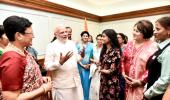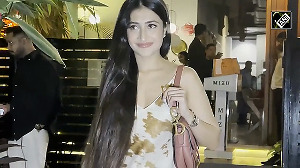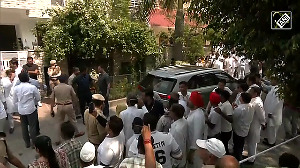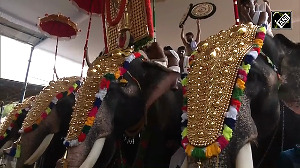'How will they give me permission to die when there are many others in conditions worse than mine?'

She was still a teenager, on the cusp of adulthood, when she knew something was wrong.
"None of us knew what was really happening to me. By the time I graduated, I was bedridden. When I completed my master's degree, I could not even go to collect my gold medal," Seema Sood, an alumni of BITS Pilani who holds a double engineering degree, tells Rediff.com Senior Contributor Neeta Kolhatkar.
The doctors had given up.
It was only in 2014, when her treatment was restarted, that she was diagnosed with rheumatoid arthritis.
Her existence for the last many years has been excruciatingly painful. In 2007, unable to cope with her struggle, she appealed to the President of India for permission to die through euthanasia -- a plea that was denied.
Three things, she says, have kept her alive since then -- her mother, who passed away two years ago, her passion for painting and her BITS Pilani batchmates, who are her constant source of emotional and financial support.
"Frankly speaking I don't want to live, but I have no option."

Could you take us through what your day is like?
I get up around 7 am.
I have so much stiffness that I have to exercise for half an hour before I can get out of bed.
After I get ready, I have to do another set of exercises that lasts for around 60 to 90 minutes. For these exercises, I call the physio. If he is not available, I take my maid's help.
After my breakfast, which I eat around 10 am, I sit with my flowers (laughs). I move around with the help of my walker, check if they are getting enough sun and tell my maid what needs tending.
Around 11.30 am, I nap for an hour. At 12.30 pm, I have to do another round of exercises that lasts till 2 pm.
When I walk, my joints get stiff and my legs become so wobbly that I need help. I have fallen so many times and that is dangerous because my joints have been operated on and my bones are weak. I have to be extremely careful.
After lunch, I sleep from 3 pm to 4.30 pm. I have to rest often.
When I wake up, I do my exercises again. To be able to walk a few steps, I have to exercise very frequently -- after every hour or two hours.
At around 6 pm, if I am free and feel up to it, I paint for a little while. Otherwise, I go outside and sit with my plants.
I eat some fruit and then nap till 8.30 pm.
When I wake up, I have to exercise again, walk a bit and have dinner.
I go to sleep by 10.30 pm.
If my maid gets the time, she massages my feet because they hurt a lot.
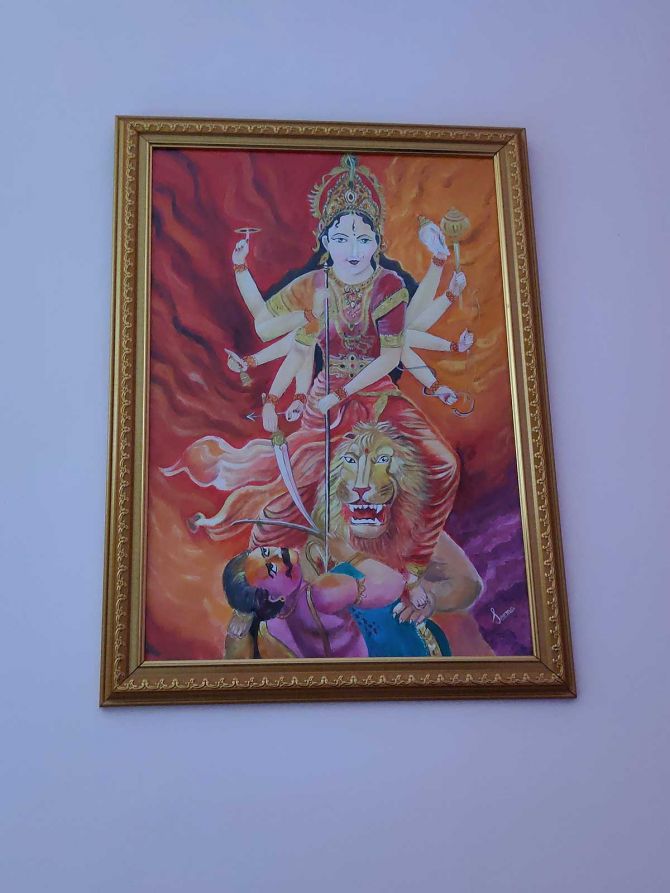
When did you begin painting?
Around 2015, my doctor told me I should do something I can look forward to each day.
"Be creative," he told me. "Don't think you have an illness."
Since I can't go into the outside world and I can't do most things, my options are limited. I can't even do an online job.
Before my surgery, I would give tuitions to school children. Now, with my health deteriorating, I have to do many exercises and rest so frequently that I am unable to do anything else.
I used to enjoy painting in school and thought I could try it again.
When I was a child, I would paint greeting cards; wishing people through greeting cards was popular then.
I always wanted to do oil painting, but it is expensive; now, I had the opportunity to fulfil my dream. I got quality paints and brushes and paint whenever my health permits me.
I started with a copy-and-colour set that my niece bought for me for Rs 10.
After that, I began to paint randomly. One day, I painted a rose and she liked it. "This is nice, Maasi," she said. "You should continue to paint."
I showed it to a friend who appreciated it. He added me to the college WhatsApp group where everyone liked the rose painting.
Their motivation encouraged me.
I have completed around 50-60 paintings. I started with copies of watercolours. Then I moved on to painting on canvas.
My batchmates conducted two auctions of my paintings in 2018.
I earned a few lakhs. It was exciting to earn this kind of money, especially since it was the first time I had done so.
I could spend the money I earned from the auctions as I wished. I gave some of it to my mother because she wanted to donate to temples and charitable causes; she particularly wanted to help poor people.
With the money I earned, we actually started living the way we wanted. I could renovate my home, which was long overdue. We both were happy.
As a tuition teacher, all this was not possible because I was earning Rs 200 per child per month.

What are your favourite themes?
Landscapes, mostly.
I get inspiration from photographs.
Portraits are not my cup of tea; I've tried doing them, but they are too intricate. Landscapes are comforting.
Are you happy?
My college mates support me.
If anything happens to me tomorrow, if a problem arises, I know they will help me.
That makes me happy.
But my condition is deteriorating. I have multiple deformities which are increasing by the day.
I have been on biological injectors and immuno-suppressants for many years now.
Since 2015-2016, I've been taking certain injections that are very strong; while they help, they also affect my immune system so I catch cold every now and then.
Last time, I couldn't take my injection for 13 months only because of various infections.
I have also not been able to take my COVID vaccination.
I lost my mother two years ago. It has not been easy to live alone and handle everything by myself. Because of my disease, I find it difficult to get out of bed and move around and do things.
I have to take steroids and painkillers so frequently that they disturb my system.
The best thing that ever happened my life was the 1985 batch of BITS Pilani. They are incredible. I have no words to describe how helpful they have been. They keep me going.
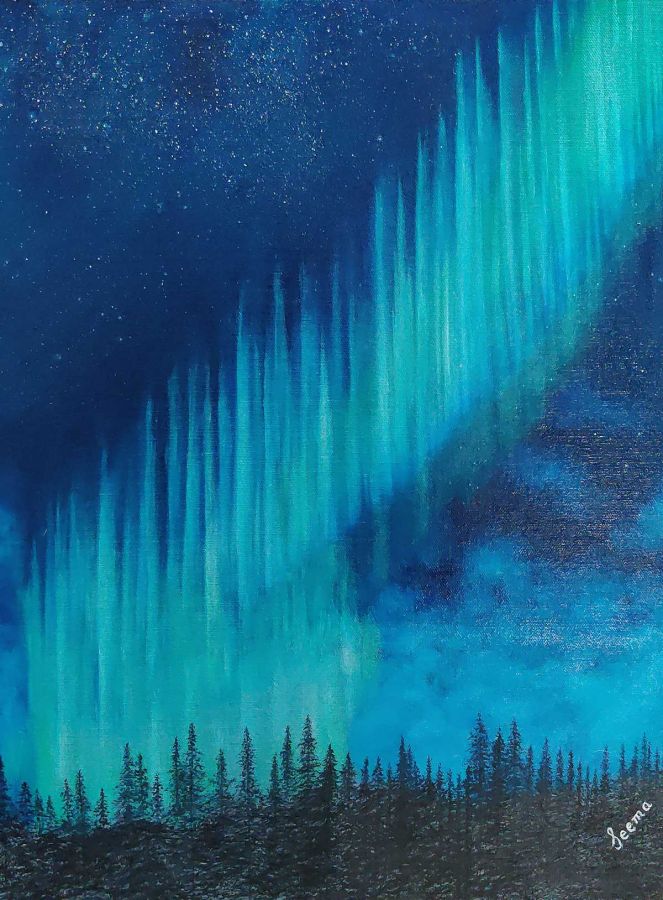
Was it overwhelming to reach out to your batchmates initially?
Yes, it was.
I always wanted to reach out to them, but there was no way for me to do so as I didn't have anyone's address or phone number.
I wanted to tell them about my illness and my suffering and find out if they had suggestions as to what I could do about it.
In 1998, when I received implants in my four joints for the first time, BITSA (the BITS Pilani Alumni Association) had come to my rescue and given me aid for my surgeries. The then chief minister of Himachal Pradesh had helped as well.
But the surgeries caused more harm.
I could not pursue my treatment because it is very expensive. We had to go to Chandigarh every time and it was not feasible for us.
As a result, my condition deteriorated.
When I applied for mercy killing (in 2007, she had appealed to the President of India), it became a big media story. BITSA came to know about my case.
They urged me to get in touch with my batchmates. I didn't have any contact details so I gave them a few names.
This was prior to the days of social media.
Once the Internet became accessible, my sister got me a tablet and a VSNL card. My niece created my Facebook profile and I began searching for my friends.
I started with my childhood friend, Roma. From her friend's list I got in touch with Smita and others from the batch. But I could not muster the courage to tell them about my condition and ask for their help.
In 2014, I got an invitation for our batch's silver jubilee celebration. At that time I just could not hold myself back and poured my heart out.
My batchmates immediately swung into action.
Sanjay came from Jammu the very next day and help started pouring in.
My batch started collecting funds for me and, like I said, held auctions of my paintings.
Every quarter, I get money from the fund they have set up for me. This has made my life relatively comfortable.
I also received a call from a doctor at the Fortis Hospital, Mohali. She said they would look into my case because the earlier surgeries had not helped. I told her I can't do physiotherapy.
For the first time, an endo-rheumatologist came on board. He did not charge for the treatment.
Finally, in 2014, I was treated for rheumatoid arthritis for the first time.
Initially, they gave me oral tablets. It triggered a lot of nausea. I couldn't eat my meals properly so my doctor started using biological injections.
I am at the last stage of my treatment now because my disease has become chronic.
Doctors say it is autoimmune disease. It started when I was around 17 or 18 years; at that time, I was in my second year.
After my graduation, I was bedridden. When I completed my master's degree, I could not even go to collect my gold medal.
None of us knew what was really happening to me.
Nobody in my family -- including my parents and grandparents -- had ever had arthritis. My mother, who passed away at the age of 84, was agile till the end while I take half an hour to get out of bed.
My father was so active; when we were at Pilani, he would cycle long distances. When we came back to Palampur, he would walk to the market which was quite a distance from our house.
After your appeal for mercy euthanasia, how did your life change?
Actually, it was very disturbing.
There was so much media attention that I started getting scared of journalists.
They would land up at any time, even at the time when I had to rest; because of my illness, I cannot entertain journalists at any time.
Also, my mother was with me at that time and she was very old; it disturbed her too.
I stopped talking to them and they lost interest, so I was okay.

COVID must have made things even more difficult.
When the lockdown started, I told the cook -- she helps me to bathe and dress and plaits my hair -- not to come.
My sister would send food.
But we could not manage for more than a few days. We asked the cook to come and we made sure we took all necessary precautions.
They all are vaccinated except me.
Thankfully, my mother was still with me then.
We have another maid at home whom we trained to cook and do a few things around the house.
She wants to leave now. When she goes, there will be no one to look after me.
How are you coping with the loss of your mother? What motivates you and keeps you going?
Earlier, whenever I felt I did not have the strength to stand or do something, my mother would say "Mata Rani tujhe shakti degi aur tu chalne lagegi (Goddess Mata Rani will give you the strength to walk)."
Now, when I find something difficult, I hear my mother's voice ringing in my head and it makes me do my exercises... (gets sentimental).
My mom is my best inspiration.
She was 32 years older than me; when I fell ill, she was around 50 years. Till she passed away at the age of 84, she was constantly by my side.
Never once, not even with a frown, did she indicate that I was in any way a burden. She gave up attending family events and stopped meeting our relatives. Even when my nani(maternal grandmother) died, she only went for some time and did not stay over because of me.
She never scolded me for anything.
My nani and my father died within a gap of one-and-a-half months. Imagine her situation! Yet, she didn't shed a tear in front of me. Instead of grieving, she focused on me.
In the 22 years since my father passed, I never saw her grieve before me even once.
Till her last breath, she worried about me (teary-eyed).
Who will do your hair was the last question she asked as they took her in the ambulance. I told her she could do it when she returned from the hospital. But she never came back... (chokes).
How is it to live like this?
(Softly) Nobody would like to live like this.
People say my life is motivating and inspiring, but I didn't want this kind of life (sobs).
I don't want to be an inspiration. I want to lead a normal life.
Frankly speaking, I don't want to live but I have no option.
In 2007, you asked the President for permission to be euthanised but were denied.
In India, mercy killing is not legal. But I believe one should be given the right to die.
Yet, how will they give me that permission when there are many others in conditions worse than mine?
There are many whose relatives don't like them; they are not provided food, they are being abused.
Their lives are worse than that of animals.
Yet, they are denied the right to die.
What is the one lesson your struggles have taught you?
Live in the moment.
I am so worried about my future.
When my circumstances are favourable, I start being positive; when they are not, I feel negative.
My future is very scary. I don't want to think about it. I just don't want to think about tomorrow.
Feature Presentation: Ashish Narsale/Rediff.com

